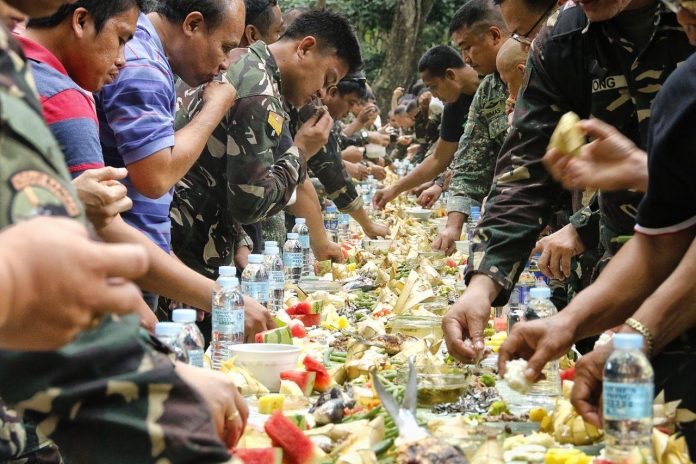A feast is a joyful occasion when we break bread and share wine, to celebrate the beauty of togetherness and solidarity. It is an event significantly marked by the creation of a new communion, or the remembrance of a sustained oneness. It is always meant to be memorable for anyone’s lifetime, that even a moment of jubilation will strengthen us for the challenges that lie ahead.
When we exchange stories and smiles over a sumptuous meal and an inviting table, we rejuvenate each other: I eat with you because I wish to relish and continue to cherish your presence to me, and you eat with me with similar mutual respect and affections. The bonds that are forged or that remain to be strong as a result of a simple yet decent dinner, seals relationships much like a blood compact, though a meal is definitely more enjoyable. Dining together is a unique shared experience which can always dismantle the barriers between individuals, bringing them towards a friendship whose ties are not so easily broken.
When the Spirit invites us to a feast, it is to celebrate, remember and preserve the beauty of holy togetherness and solidarity in his kingdom. This powerful reign of everlasting peace and harmony founded on humility and selflessness, assures its continuity in the ritual eucharistic meal which we enjoy regularly, that we are rendered mindful of the peace that has been gained, and inspired to carry on the struggle for the goals yet to be achieved. Our joint partaking of the spiritual bread similarly brings us to divine friendships though lived within an earthly community, are vital underpinnings to the becoming of his heavenly realm.
The feast thus regularly reinforces our resolve to ultimately accomplish the kingdom of God. The sacrifices we endure to help one another in realizing the kingdom, is rewarded by the providence of his feast. The sacred Eucharist forever declares the glorious marriage of heaven and earth, and proclaims the eternal love of the magnanimous bridegroom for us, his fragile bride.
So, when we do not come to his feast, we deny the importance of the kingdom. We despise solidarity and hence, we do not deserve its fruits of peace. But note that the Lord does not make any distinctions between who he invites to his feast. He never meant that the kingdom is only for those who are good, and not for those who are evil – Christ is calling both the good and the evil! Therefore, those who will never be part of his kingdom, are not those who have initially made the mistake of doing evil, but those who whether good or not, refuse to come to the feast.
But when we do come to the feast, we must try to be worthy. Whether good or evil, we must prepare ourselves to put on the garment of love, humility and compassion, by first reconciling with the Spirit. For how else can we thrive in a kingdom of justice, if we carry the seeds of injustice in our hearts? Our worthiness is thus not measured by our being good or by our falling short of being good. It is assessed according to our desires and actions to remain good; of if we are falling short, according to our desires and actions to becoming good. Therefore, those who will also never be part of his kingdom, are those who have consciously chosen to remain evil.
Though miserable sinners we are, for as long as we embrace the habit of repentance and renewal, the feast through which we can enter the gates of his social paradise, will always be open.
Brother Jess Matias is a professed brother of the Secular Franciscan Order. He serves as minister of the St. Pio of Pietrelcina Fraternity at St. Francis of Assisi Parish in Mandaluyong City, coordinator of the Padre Pio Prayer Groups of the Capuchins in the Philippines and prison counselor and catechist for the Bureau of Jail Management and Penology.
The views expressed in this article are the opinions of the author and do not necessarily reflect the editorial stance of LiCAS.news.









